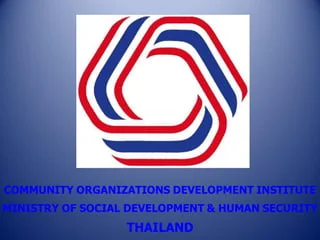The experience of the Community Organizations Development Institute in Thailand
The Community Organizations Development Institute (CODI) in Thailand plays a pivotal role in enhancing the capabilities of communities, both urban and rural, to manage their development processes. Established in 2000, CODI emerged from the merger of the Urban Community Development Office and the Rural Development Fund, evolving into a public organization that empowers communities to be central actors in their own development initiatives.

Mission and Objectives
CODI’s primary mission is to support community-driven development by providing financial resources and facilitating collaboration among various stakeholders. The institute operates on the principle that communities should be at the forefront of decision-making regarding their development needs. This approach not only addresses poverty but also fosters a sense of ownership among community members, allowing them to actively participate in projects that affect their lives.
Key Functions
- Financial Support: CODI manages a revolving fund that offers soft loans to community cooperatives and networks. This funding enables communities to undertake diverse initiatives, including housing projects, land purchases, and livelihood improvements.
- Capacity Building: The institute focuses on strengthening community finance systems, which are crucial for sustainable development. By providing training and resources, CODI helps communities develop effective funding strategies and unlock their potential for growth.
- Facilitation of Collaboration: CODI creates platforms for communities to connect with one another, learn from shared experiences, and collaborate on common goals. This networking is essential for building resilience and negotiating with external stakeholders.
- Policy Advocacy: By translating successful community projects into national policies, CODI ensures that the voices of community members are heard at higher levels of government. This advocacy is vital for legitimizing community-led initiatives and securing necessary resources.
- Partnership Development: Recognizing that complex issues like poverty cannot be solved in isolation, CODI promotes partnerships among government entities, civil society organizations, and academia. This collaborative approach enhances the effectiveness of development efforts.
Community-Centric Projects
One of CODI’s hallmark initiatives is the Baan Mankong Collective Housing Program. This program emphasizes participatory planning where slum communities work alongside local governments and NGOs to improve housing conditions and secure land tenure. The success of this initiative illustrates CODI’s commitment to decentralizing decision-making processes and empowering local populations.Additionally, CODI has launched projects aimed at supporting communities affected by disasters, such as the Community-based Livelihood Support for Urban Poor Project following the 2011 floods. This project focuses on rehabilitation efforts that prioritize community involvement in rebuilding their lives and infrastructure.
Challenges and Innovations
Community Organizations Development Institute faces challenges inherent in fostering a bottom-up approach within a traditionally top-down governance structure. To address these challenges, it continually seeks innovative methods to engage communities effectively. The institute has developed social innovation tools that facilitate non-linear processes of community engagement, allowing for flexibility in adapting strategies based on local contexts.
Case Studies
Recent case studies highlight the diverse applications of Community Organizations Development Institute’s methodologies:
- Chulabhorn Pattana 9 Community: This southern community has embraced nature-based tourism as a means of promoting biodiversity while fostering relationships with visitors rather than treating them merely as customers.
- Nong San Community: In contrast, this northeastern community has adopted a decentralized model where individual micro-entrepreneurs collaborate loosely to offer tourism packages, emphasizing business incubation for women.
Both examples underscore the importance of tailoring approaches to fit specific community dynamics while leveraging local strengths.
Conclusion
Community Organizations Development Institute exemplifies a model of community empowerment where local organizations are supported to take charge of their development trajectories. By providing financial resources, facilitating collaboration, advocating for policy change, and fostering partnerships, CODI not only addresses immediate needs but also builds long-term resilience within communities across Thailand. Through its innovative practices and commitment to participatory development, CODI continues to transform the landscape of community engagement in Thailand, ensuring that people remain at the heart of development processes.
Also Read: Urbanization in Sri Lanka – An Emerging Challenge
